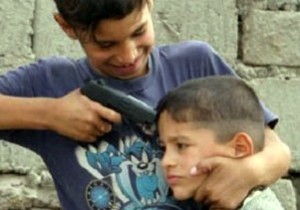You have a gun (or guns). You have a pool. You have a hot fire, and lighter fluid. You have guests-family members, no less. They have children, who don’t know your rules. By all appearances, they don’t know about rules at all and, perhaps unsurprisingly, it may be that their parents don’t either.
The plot thickens.
I hope that few of us experience the incompatibility a reader depicts with his brother in Dan Zimmerman’s “Family Dynamics, Gun Safety and Responsibility”.
Dan is the managing editor of The Truth About Guns where he usually writes about simple subjects like gun politics, fine distinctions in performance among ammunition variations, the role of law enforcement in society, and why carry methods and firearm tactics can go so well or so badly. There’s no contest, though, when it comes to the complexities of navigating one’s own family. As Tolstoy put it, “every unhappy family is unhappy in its own way”.
Dan’s correspondent, apparently childless Michael from Georgia, held a family barbecue that included, by his description, his cluelessly liberal brother and his two boys, affectionately labelled “the Hell Hounds” and “Thing 1 and Thing 2”. We all know some like that (at times, I admit, they’re my own two kids). If my foreshadowing wasn’t too subtle, you know before you read his article that his nephews mixing it up with water, fire and maybe guns can’t be for the best.
This autobiographical snippet raises the old question of nature vs. nurture. How can brothers come to be so different despite having been raised by the same parents, the same values, the same family expectations? But Michael is long past wondering about that. He’s appalled at how their next generation is setting new records in disrespectful damaging “play”. (A mother of three boys once described them to me as “the three Ds: Dirty, Dangerous and Destructive”.)
The main question raised asks who exactly is responsible for potential casualties. Is it the parents whose children seem to have learned social behavior from Tom and Jerry? Is it the host whose stuff is both at risk and used riskily by them? And, as ever, is it about the guns, which may or may not be routinely secured unloaded with trigger locks in an impenetrable gun cabinet within a sealed safe room, for which the ammunition is under separate lock and key elsewhere?
As a psychiatrist, I was intrigued by the family dynamics so plainly on display between two brothers who see life so differently, as in “when you bring them over, am I responsible for looking after them?”

